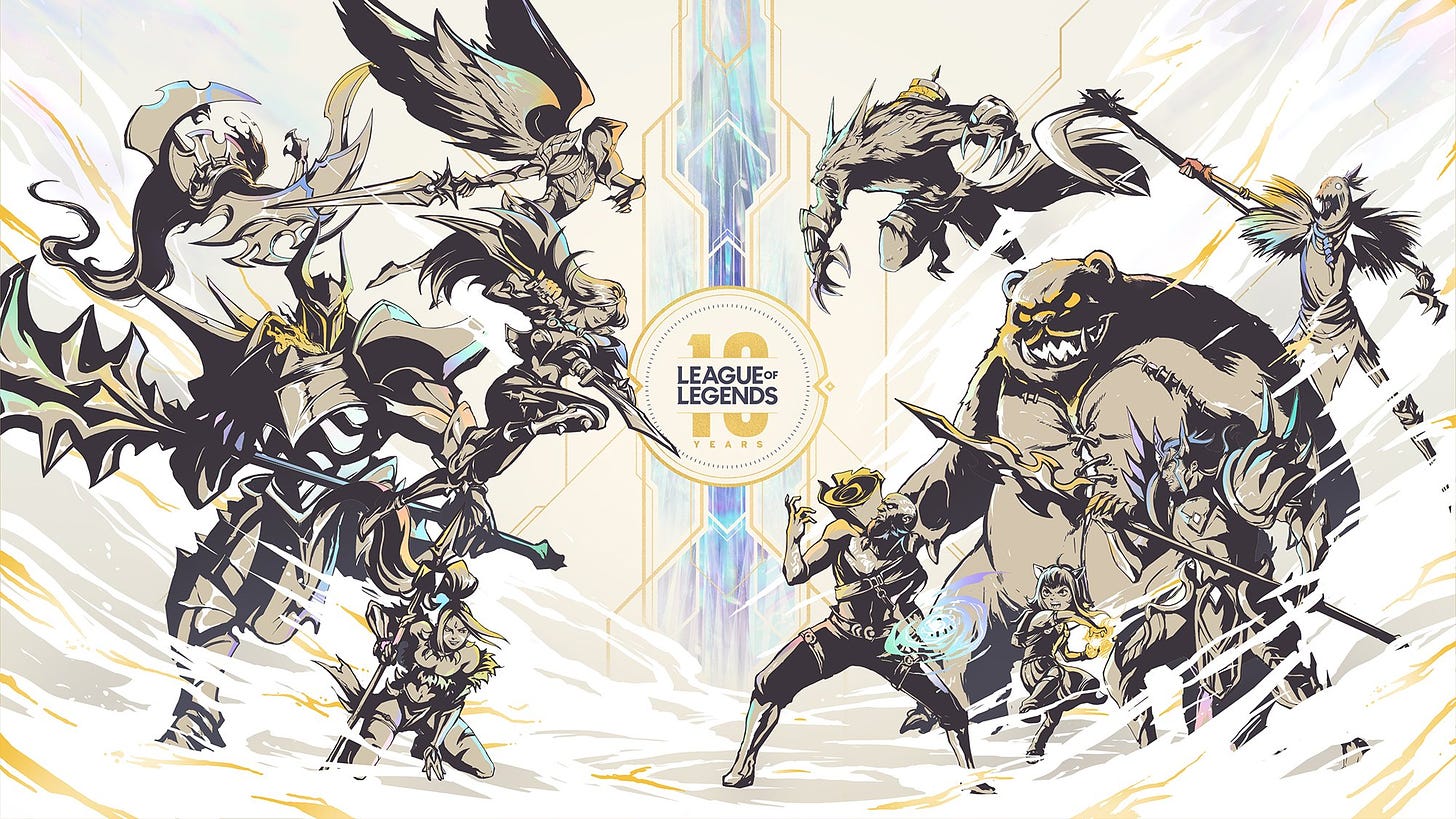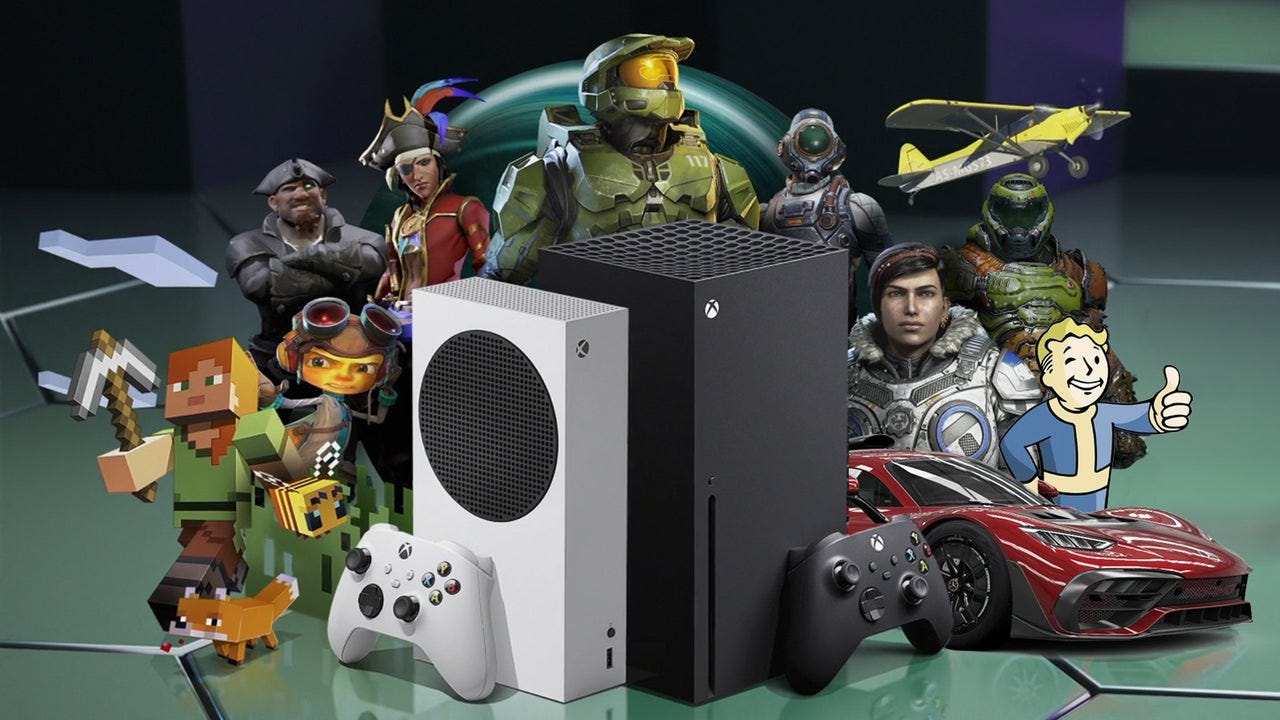Meet the Spiciest Creative Agency in Gaming
push to talk #11 // feat. the hooligans behind SUMMONER, a new gaming-focused creative agency
Like many marketers working in gaming, I’ve suffered through some truly embarrassing pitches from creative agencies. Let’s trap your designers in a cavern with Jimmy Kimmel for a week and film it! The gamers love Jimmy!1
For whatever reason, most traditional advertising agencies are hopeless idiots when it comes to gaming. So it comes as an enormous relief to report that there’s now a creative agency that actually understands players. A full story about the hilarious and always-spicy founders of SUMMONER is below.
But first up, this week’s most widely-shared news links.
Scuttlebutt and Slackery
The week’s most-shared, oft-Slacked, and spiciest games industry news links.
Do Game Consoles Have a Future? - Peter Moore—former President of Sega of America and big boss on the Xbox 360—says that big console makers like Xbox are likely debating whether their hardware lines have a future. “Are we ready to gird our loins financially for battle and all of the cost of development, silicon development? What is it that PS6 can do that PS5 can’t that would make people jump from PS5, or same with Xbox, same with Switch, right? God forbid it's just incremental.” Very interesting Q&A. (IGN)
A Hilarious Q&A With Pokémon’s Former Chief Lawyer - The best part of this interview is when the reporter realizes he has probably accidentally contributed to Nintendo & Co’s legal arm taking down Pokémon fan projects in the past. “How did you find them, and where did you draw the line on what's allowed and what the company thinks needs to be shut down?” the reporter asks. “Short answer: thanks to you folks,” the lawyer responds. “I would be sitting in my office minding my own business when someone from the company would send me a link to a news article.” LOL. (Aftermath)
Apex Legends Team Affected By Latest EA Layoffs - The reportedly “two dozen or so” Respawn employees laid off this week were part of the previously-announced 670 EA employees affected in the company’s latest layoff wave. At least one of them is someone I have personally managed and who I can attest is best-in-class at her job. So, like, what are we even doing here, people? An own-goal on the part of EA leadership. (PC Mag)
Why Marketing Isn’t The Problem With Your Indie Game - This video essay from Eastwatch’s creator is a must-watch for any developer shipping a game on Steam. He lays out a great framework for thinking about how to compare your game to other titles in your genre, and shares some very useful tools. His point about the importance of your game’s curb appeal aligns really nicely with some discussions I’ve had with other developers in recent months. This is 8 minutes and 58 seconds of pure wisdom. (YouTube)
Meet the Spiciest Creative Agency in Gaming
Matthew Manarino is a free man, and he's ready to talk some mad shit.
After 10 years working as a creative marketer on games, most recently as Group Creative Director on Fortnite, Manarino—with co-founders Kal Nguyen and Jordan Schmidt—has started SUMMONER, a new creative agency focused on gaming clients.
SUMMONER'S message to game developers: other agencies are full of goofballs who don't know the first thing about gaming, but we've worked on games your players love, so give us a shot.
Now, a lot of you are probably thinking: What is a creative agency and why should I care?
I can empathize with this. Ten years ago I'd never worked in an actual marketing org, so when I got into games and encountered people whose job title was "Creative Lead," I was skeptical. Like, really? You're creative, that's your job? Woweee! Somebody get this guy some glitter and glue sticks, let's see what he can do.
This was the mid 2010s, so people were getting hired into all kinds of fake-sounding jobs. Hell, I was one of them. Besides myself, there were at least eight other people with the title "writer" working on a single game—League of Legends—so it's not like I was in a position to talk about people with sussy titles. But still, I was unconvinced about the "creatives.” It wasn't clear to me what they actually produced.
My skepticism lasted until the first time I sat through a marketing meeting with a creative lead and listened to the way other stakeholders on the team talked about how they wanted their new trailer to look and feel.

It was rough. Even if a developer knows how to make a great game, they don't necessarily know the right words to express what's special about it. So when it's time to show that amazing game to the world with a trailer, or a logo, or whatever, you see devs struggling. Most people default to pointing at examples of things other games did that they liked and saying "this was so cool, can we make it like this?"
What happened in that first meeting was something I saw repeated over and over again. The creative lead would nod along, listening, then ask pointed questions about what exactly the stakeholder liked about the thing they were referencing. Was it the look? The music? The way it made them feel? Slowly, after being pushed and prodded, the stakeholders were able to find better words to express themselves. They started talking about the things that really mattered to them, the real reasons they care about their work.
After half an hour or so of that, we'd all stand up and leave—onto the next meeting. And the next week, the creative lead would come back with a pitch for the trailer that, nine times out of ten, was way closer to what the stakeholders had envisioned in their minds. Then the process would repeat. The stakeholders gave feedback, the creative lead asked questions, then went off to talk to whatever agency was making the trailer, and a week later you'd have a trailer that everybody agreed was even better.
So what does a marketing creative lead actually do? It's straightforward: They help you make marketing assets that don't suck. They investigate and articulate the impossible-to-grasp core of your vision and translate that for both the people building the product and the people responsible for making the assets. If that sounds kinda like made up frou-frou nonsense, you've never worked at a big company, and you've never seen how teams can get bogged down on disagreements about a creative issue for months upon months. A good creative director clears out the thickets that hold teams back and make the goal more obvious for everyone.
This stuff matters. Whether it's for a game trailer, your logo, your website, screenshots, or any of the other stuff you have to cook up to communicate online, the quality of your creative (yeah, it's a noun now) can determine the difference between a banger launch and your product landing DOA. And if you have a really good creative lead, they might actually help you make something that people love.

The longer you work in marketing, the more you start to think that maybe the creative is the main thing that matters, aside from (obviously) the actual product being represented. Now, when I see a trailer for a game that really kicks ass, I go try to find out who the creative lead was on the project. Almost every time, I find that they've done some other totally different thing I also liked.
So, recently, when I decided I needed a proper logo for Push to Talk, I reached out to my friends at SUMMONER.
I gave the SUMMONER team a bunch of stupid, semi-articulate references for what I thought I wanted, and talked about what I'm trying to do with my newsletter. They came back a couple of weeks later with a half-dozen amazing options—designed by the legendary art director Jane Lim—that were all way better than anything I would have come up with. They understood what's special about what I'm trying to do, and they found somebody who could bring that out in a way I couldn't on my own.
The Problem With Traditional Agencies
A lot of big games studios, particularly those with live service games, have a never-ending need for marketing assets, says Manarino. And, in a perfect world, they'd get all those assets from people in-house.
"The reason you want heads internally is because those people live and breathe that game. Those are the people who are going to understand your game better than anyone else in the world, because they're having lunch with the developers every day. It's in their bones, right?”
Manarino led creative on the above video for the League of Legends 10 Year Anniversary celebration event. It was a collaboration with the editing house Rock Paper Scissors and Elastic, the 3D animation studio behind the intro sequence for Game of Thrones.
The challenge though, is that headcount is expensive. You can only afford to have so many creative leads working internally full-time, so when you have a big launch coming up it's natural to go to an agency and bring in some extra brains to help you launch cool stuff. This, says SUMMONER co-founder Jordan Schmidt, is where you'd start to run into issues.
"You'd bring in an agency who would claim to totally get gaming and love gaming, but then they were only capable of talking about gaming in the broadest possible sense," says Schmidt. "Like, imagine if you hired an agency to make a campaign for the Las Vegas Raiders, and they were like 'oh yeah, we know all about sports fans!' They talk about Call of Duty fans and Magic the Gathering players all under the same umbrella of "gamers."
These agencies come in to pitch, and they're always like "I'm the Executive Creative Director and this here is Donnie. He's our intern and he's ranked plat in League of Legends. So we're covered, you know? Like we got you guys, you're in good hands." And I'm like… that's your intern. You are going to throw him down some stairs after this meeting is over. Donnie is never going to talk in another room ever again.
–Matthew Manarino, co-founder of SUMMONER
The creative ideas coming from many of the outside agencies, says Manarino, often boil down to something as generic as "teenagers holding controllers on couches and esports pros with their arms crossed." Or, even worse, something "totally saccharine like those British department store ads they run every Christmas where a teddy bear saves a kid from drowning or whatever."
Manarino rubs his temples whenever he recalls his time working on League of Legends esports. "Creative agencies would come pitch their ideas, and it was always 'Yo, did you know this is a f***ing sport guys! Can you believe that these kids are athletes?' And we were like dude… we know. We don't want to start from there, we understand all this and our audience already gets all this."
Part of the inspiration for SUMMONER, then is addressing the industry’s desperate need for better options: "I don't want my friends who work at these studios to get f****** bilked by some dogs*** agency who charges them a fortune and does really bad work. I've seen it happen constantly. They're like, dude, we totally get gaming, sign this huge retainer with us. And the work is just horrific. Right? I don't want it to happen to my friends."
Another Creative Lead Weighs In
Having seen this stuff firsthand, I tend to buy into everything Manarino is saying, but I wanted to know whether I'm biased in SUMMONER's favor just because I've known the founders for a long time. So I asked one of the smartest creative directors in gaming what he thinks about them.
Anton Borkel is the Group Creative Director for League of Legends marketing. He has led creative on some incredibly powerful campaigns, including trailers like the 2020 music video, Warriors, which got over 150 million views. He also led creative on the original trailer for Dead Island, which is regularly namedropped as one of the greatest game trailers ever.
Of the three SUMMONER founders, Borkel has mostly worked with Manarino, who he calls a study in contrasts: "He [Manarino] is a creative through and through who has worked in restrictive corporate environments for most of his career. He's a cool guy with lots of tattoos who is also a softy and family man. He's the kind of guy who could convince you how stupid podcasts are one day, then turn around the next day and make one. He's not a fan of agencies, yet here he is starting one himself."
Borkel, who is very German, says he struggles to find "a good English saying" to describe Manarino. "It's like he's trying to run in two opposite directions simultaneously? And it's kinda stupid, but kinda inspiring at the same time?" he says.
Generally, Borkel says, he prefers to work with people like this.
(This is one of the best compliments I’ve ever seen him give someone.)
What’s Next for Summoner
Currently, SUMMONER is working with startup studio Theorycraft Games, which is led by Joe Tung.
"He's the real deal," Manarino says. "He's open and honest and lets his people do great work. We really want to work with people like that, who understand the value of creativity and the value of being authentic with their audience. If you don't understand why that's important, we're never going to be able to communicate our true value to you."
Although the SUMMONER team is very busy sucking up to Joe Tung, they tell me they do still have room for one or two more clients.
"We want to be chief creative officers for hire that can come in and help you figure out all of this stuff," says Nguyen.
If you're shipping a game, and you know what's good for you, go find them at SUMMONER.STUDIO and on LinkedIn.
That’s it for this week. I’m gonna go see if Donnie the intern is okay. I think he might be dead, you guys.
See you next Friday.
This is only like 10% more exaggerated than a real pitch I once sat through.








god I miss Matt Manarino, he is such a cool dude. <3